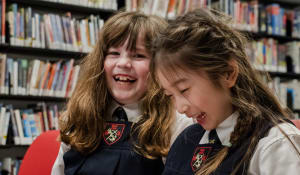
A classroom at the Academy for Gifted Children - P.A.C.E. in Richmond Hill, Ontario. PHOTO BY: Tim Fraser
Imagine observing a Grade 11 chemistry classroom with 25 students. It is the first day of school and the teacher walks into the room. Out of the 26 people in the room, who would you expect to have the best understanding of chemistry? If you said the teacher, welcome to the world of common sense. Obviously, the chemistry teacher, who has taken university courses in chemistry, has knowledge and understanding that the majority of students, if not all of them, currently lack. That's why the children in school are called students while the teachers are paid for their knowledge and their ability to transmit that knowledge to the students.
Obviously, effective teachers use a variety of strategies and techniques to help students learn a subject. However, parents should be concerned if high school chemistry teachers allowed the students to decide their own learning goals and construct their own understandings of chemistry. Some students could set their goal to learn as much chemistry as possible while others could set their goal to learn as little as possible. Is this choice sensible? Certainly not, and no self-respecting and competent teacher would allow it.
Teachers Promote Greater Understanding of Subjects
Essentially, this reasoning applies to every subject at every grade level. Most parents expect that teachers have a better understanding of the subject matter than students, and that they have the skills and ability to teach the students. If so, why should students, parents, and taxpayers, tolerate having the students determine the learning goals? Teachers are granted authority, and they are paid, because they have the knowledge and skills to teach the students. If teachers are not better versed in the subject than their students, and if they cannot promote greater understanding of the subject matter, then they should not be given authority in classrooms and they should not be paid as teachers.
How does teaching and learning take place outside public schools? Can you imagine a driver education academy that called itself student-centred and reduced the responsibilities of instructors to facilitators? What would parents think about a driving instructor saying, "I can't really teach you to drive; you must learn by yourself." Or worse, "you tell me how you want to drive, we will try it out, and then I'll help you drive that way."
In such an academy, the instructors could avoid being "experts." Instead, they would be fellow students who were also learning how to drive. Most people probably recognize the absurdity of allowing student drivers to set their own goals and decide on their own methods of learning to drive. There are already too many traffic accidents without the foolishness of student-centred driving schools.
Obviously, public school teachers are not mere learning facilitators or coaches. Rather, teachers have the responsibility to ensure that students learn the essentials of reading, writing, poetry, art, music, and all the other subjects that make them educated citizens who will participate effectively in a democratic society. This principle is true for teachers in Grade 3 classrooms as well as for teachers in Grade 12 classrooms.
An unhealthy fixation with student-centred education leads to the conclusion that specialized advanced knowledge and training for teachers is unnecessary because teachers are learning alongside their students anyway. Contrary to this romantic progressive view, teachers must use their specialized education, skills, and the understanding they have of their students to actually teach them and direct their learning in productive ways.
Students First Nova Scotia
"Students should come first" in education, "not adults in the system," parents and citizens urged at a public forum in Halifax. Drafted by a group of 16 Nova Scotians on March 28, the Declaration of Principles, entitled "Students First Nova Scotia," calls upon concerned citizens to rally behind a reform agenda encouraging education authorities to "elevate teaching, empower parents, raise standards, and spend wisely." Read more here.
—Michael Zwaagstra co-authored the book What's Wrong with Our Schools and How We Can Fix Them in 2010.






















